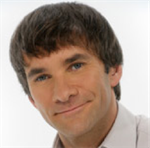Text excerpt: Putting your team together
Why are advisory groups so helpful?
It’s easier to hold yourself accountable to a group of other people.
People don’t want to let other people down — particularly if they’ve already created a social infrastructure of caring about someone. You don’t want to let them down.
The basic principle of my book, “Who’s Got Your Back,” is that if you build a social infrastructure which consists of a combination of caring, intimacy, and vulnerability, if you create that intimacy coupled with a commitment to each other, it gives you a higher level of accountability and candor which we need in order to be more successful.
Why does it seem like the most successful people work alone?
Basically the media sucks. They’re evangelizing the lone hero.
What kind of relationships do the most successful entrepreneurs have?
Take Ted Turner for example, I was with him when he was interviewed with Charlie Rose at the Aspen Institute for a Fortune conference. He cried talking about his relationships and how deep and important they were.
The people that I know who are at the top, every single one of them has these kinds of relationships. Jamie Diamond is one of the most aggressive and successful bankers in the marketplace. He would credit the reason he’s not in the same messy soup that everybody else in banking got in, he credited it to his senior associate group.
They’ve been together forever. Mike who was one of my classmates is his CFO. These guys have been together forever. They tell each other the truth. They treat each other, richly and deeply emotionally and they’ve got each other’s backs.
Should your advisers meet in a group or one-on-one?
For me it started with lifeline relationships, one-to-one. So, it was a little hub and spoke.
Then I started realizing that one-on-one relationships will often crumble too quickly because all that has to happen is one week one of you is busy and you don’t call the other. The next thing you know, it’s a month before you talk to each other.
It starts to solidify when you get a group of three or four. The group of three or four is powerful because then it’s institutionalized. Then, you got a meeting time. Then, if one of you is lazy that week, or if two of you are lazy that week, chances are one person is going to show up and kick the rest of you to actually have the meeting.
So, the more formal the system, the more structured, the more likely this is going to work for you
How can you tell if someone should be in your advisory group?
I don’t think you need to reach out to somebody and the first thing you say is, “Hey, do you want to be in my lifeline?” That could overwhelm some people.
Start with, “Let’s go to dinner. I got a house out in Malibu for the summer. Why don’t we go chill out there and, you know, kick back and have some raw oysters and some beer some night?
And as we’re sitting around talking, what I’m testing for is the four principles from the book (generosity, vulnerability, accountability and candor). I’m testing for whether or not I feel safe being vulnerable with you or not. I’m testing for whether or not you’ll return that.
I was vulnerable with one of my friends. Let’s call him Jay. I said, “You know Jay, times have been tough lately and I’m not exactly sure I’m really a good manager and I’m worried even about my leadership skills.”
And it was interesting because he didn’t want to go there. That was too uncomfortable for him. He certainly wasn’t going to be vulnerable himself.
There are other friends where you try to go candor. It’s like, “Hey, you’ve known me for a long time. Tell me what you’ve observed in me that you might have choked back thinking that I didn’t want to hear? I can tell you I do want to hear it. I do want to hear it because I’m looking for feedback and input. Tell me.”
You’re testing for the generosity as well. Do they give a damn about you? Will they show up?
You’re testing for the accountability. After the dinner, you want to say, “Well look, let’s make a promise to each other. I promise this week, I’m going to go investigate this and you promise you’re going to that. Let’s touch base at the end of the week.” It would be interesting to see if they call. And it would be interesting to see if you call, will they return the call.
That’s the “long, slow dinner.” You’re testing for whether they’re the right person.
What’s the first step you can take after watching this program?
Do yourself a favor, think today of one that you would like to invite for your long, slow dinner — or a long slow cup of coffee at Starbucks, or a long slow conversation on the phone.
Pick the one person that you feel safe enough with to reach out to and say, “Hey, do you have a moment? I would like to schedule may be a half hour to chat about what’s going on in my life, where I wanna go and if I am on a right path to get there. I would love your advice.”
Its that simple and that could actually start something that could transform you for a very long time.
I promise you the little movements you make today — and the first move in reaching out to another person to share the brainstorm, to hold you accountable — those little movements today will mean that your trajectory will fundamentally change between failure and success for that issue.
Full program includes
- A small change in mind-set that will surround you with supporters.
- How to put together your personal advisory team.
- The techniques that helped Keith triple his company’s earnings in one year.








